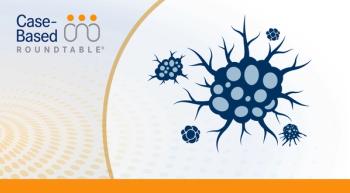
Investigational DNA-Targeting Agent Shows Efficacy in MGMT-Unmethylated GBM
Patients with newly-diagnosed, recurrent, and first-line MGMT-unmethylated glioblastoma multiforme exhibited a promising median progression-free survival and median overall survival in two phase 2 trials of VAL-083 compared with historical data.
Patients with newly-diagnosed, recurrent, and first-line MGMT-unmethylated glioblastoma multiforme (GBM) exhibited a promising median progression-free survival (PFS) and median overall survival (OS) in two phase 2 trials of VAL-083 compared with historical data, according to a press release from Kintasa Therapeutics, Inc.1
According to the presented at the Society of Neuro-Oncology
For the patients with first-line GBM on the planned 30 mg/m2 phase 3 initial dose, the median PFS was 8.7 with VAL-083 versus the same historical data. The cutoff date was October 23, 2020, for these data.
In the recurrent setting, there was a median OS of 8.7 months with VAL-083 on the phase 3 initial dose compared with 7.2 months in a past trial of lomustine.4
“These data continue to confirm VAL-083’s compelling potential as a potent DNA targeting cytotoxic agent for the treatment of GBM,” John de Groot, MD, professor in the department of neuro-oncology at The University of Texas MD Andersen Cancer Center and a founding member of Kintara’s Scientific Advisory Board, said in a press release. “I’m particularly encouraged by VAL-083’s continued ability to demonstrate a favorable PFS trend as compared to temozolomide historical data in newly-diagnosed GBM, and improvement in OS compared to lomustine historical data in the recurrent setting.”
The recurrent population were receiving VAL-083 as second-line therapy after progressing on temozolomide in the first line were enrolled in an open-label, phase 2 study at The University of Texas MD Anderson Cancer Center. Thirty-five and 49 of the 84 patients enrolled by the time of the data cutoff were receiving the initial dose of 40 mg/m2 daily and the planned phase 3 initial dose of 30 mg/m2 daily, respectively. There was a median OS of 7.6 months (CI, 6.4-10.6) for the 77 evaluable patients who completed at least once cycle of treatment. In the 43 efficacy evaluable patients receiving the phase 3 initial dose of 30 mg/m2 daily, median OS is currently 8.5 months (CI, 6.8-13.7).
The 27 evaluable patients with newly-diagnosed disease received VAL-083 as adjuvant therapy after radiation and temozolomide therapy on this trial. Myelosuppression was the most common adverse event (AE) in both patient populations with the study drug, which was consistent with prior studies. Of the patients with recurrent disease given the phase 3 initial dose, 3 had a serious AE potentially related to VAL-083 and 1 patient had a possible drug-related serious AE in the newly-diagnosed group.
The other open-label, phase 2 study being conducted at Sun Yat-sen University Cancer Center in China is investigating patients with newly-diagnosed disease receiving VAL-083 in the first line. As of their data cut-off of October 21, 2020, the 29 patients who completed at least 1 efficacy assessment. The median PFS was 9.3 months (95% CI, 6.4012.0). There were 25 patients receiving the phase 3 initial dose in combination with standard radiation treatment.
“I’m extremely pleased with the continual progress being achieved by both of these ongoing phase 2 clinical studies evaluating VAL-083, as the results garnered thus far are an indicator of the compound’s potential to be an important therapeutic option for GBM patients in the recurrent, newly-diagnosed first-line, and newly-diagnosed adjuvant treatment settings,” Saiid Zarrabian, Kintara’s chief executive officer, said in a statement. “It is a pleasure to present the data updates at the SNO’s Annual Meeting, as these studies have provided valuable insight in initiating the VAL-083 arm of the Global Coalition for Adaptive Research GBM AGILE registrational study which is expected to occur later this year.”
References:
1. Kintara therapeutics reports 10 months progression-free survival in newly-diagnosed MGMT-unmethylated GBM from ongoing MD Anderson Cancer Center phase 2 study. News release. Kintara Therapeutics, Inc. Published November 19, 2020. Accessed November 19, 2020. https://yhoo.it/2UJhZOc
2. Hegi ME, Diserens AC, Gorlia T, et al. MGMT gene silencing and benefit from temozolomide in glioblastoma. N Engl J Med. 2005;352(10):997-1003. doi:10.1056/NEJMoa043331
3. Tanguturi SK, Trippa L, Ramkissoon SH, et al. Leveraging molecular datasets for biomarker-based clinical trial design in glioblastoma. Neuro Oncol. 2017;19(7):908-917. doi:10.1093/neuonc/now312
4. Wick W, Gorlia T, Bendszus M, et al. Lomustine and bevacizumab in progressive glioblastoma. N Engl J Med. 2017;377(20):1954-1963. doi:10.1056/NEJMoa1707358







































